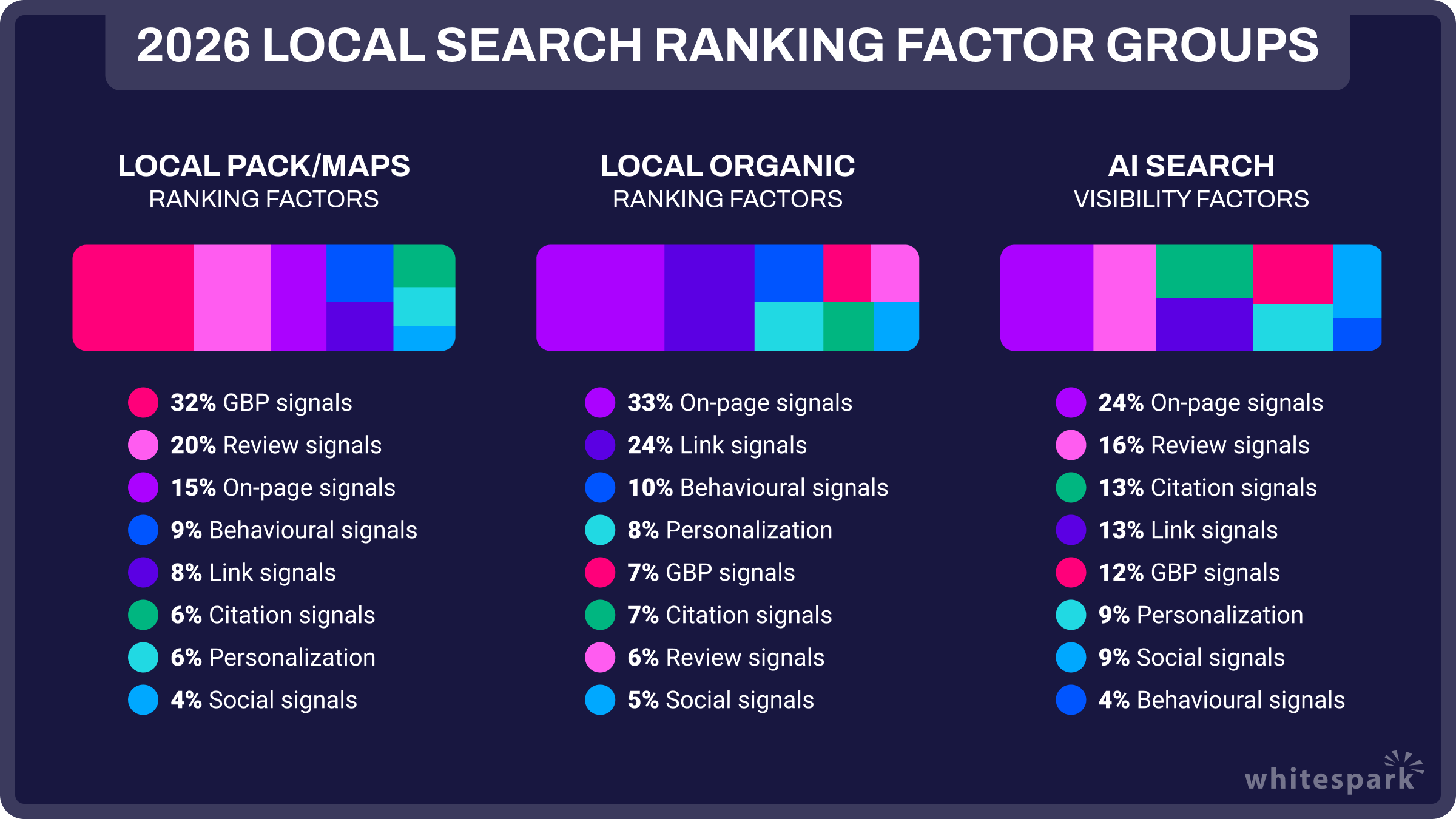The 2026 Local Search Ranking Factors survey is as full of insights as ever. It was published yesterday, over at Whitespark. (As always, a big thanks to Darren for organizing it and herding the cats.)
If you do nothing else today to improve your understanding of local SEO and ability to get more visible in local search, pour yourself a mug of your finest moonshine and read through the survey or watch the video recap. There’s a ton of useful info, whether you like to get into the details or just want a quick gut check.
In case you don’t have time to read the full survey, at least you’ll want to skim through the comments. That’s always been my favorite part of it anyway. Sometimes you find gold nuggets in there.
Even the comments section is a long read, though, which is why I’ve rounded up what I consider the 10 best comments from the 2026 LSRF. Of course, you’ll find many other insights in the survey, so I suggest you read the whole thing sooner or later. This is just my curation of it, similar to the one I did back in 2017, which has aged unexpectedly well. By the way, I’m not including my own comments on this top-10 list. That would be unsportsmanlike. (My comments are lurking in the survey, if you’re interested.)
So here are my 10 favorite LSRF comments, in no particular order, each with an extra-valuable local SEO lesson that can help your business become a little more visible:
1. I got 20 teenagers to search for a PI attorney in Pleasanton, click on their GBP, then use GMaps to drive to their office every day for a week. Within a week they were #1 for PI attorney queries in Pleasanton. This got me thinking about how we can get clients to encourage this kind of behavior – asking employees to always do driving directions on their commute, holding events, etc. If you have access to plenty of teenagers, this is the strategy for you. – Andrew Shotland
Google cares about what I call “signs of life.” Those may include all kinds of little actions people take as customers or on the way to becoming customers, and they almost certainly include driving-direction lookups and customers’ reviews. The late, great Bill Slawski documented this back in 2013. – Peanut Gallery Comment from Me
2. Discovering new “FOMO” words for title tags still works well. “BEST”, “FREE CONSULTATION”, “TOP” etc. – Colan Nielsen
Colan is zeroing in on exactly which part of your title tag can get people to click. The words he mentioned can be extremely compelling, as can be “Open 24/7,” “Emergencies Welcome,” “Affordable,” etc. Also, his suggestion to discover new zinger phrases is important. I find that great ways to do that include (a) sifting through your Search Console data and (b) sifting through your and your competitors’ reviews. – Peanut Gallery Comment from Me
3. AI Mode is going to be the dominant interface for searchers. Google will get very good at prompting the searcher through a buyer journey. It’s going to feel like a much better version of an IVR flow (e.g. “press 1 for xyz”). A searcher will ask Google why their lemon tree is dying, Google will ask for a photo of the tree and provide a diagnosis, then it will ask the searcher if it would like recommendations for fertlizer or nearby arborists, etc. All queries are going to be “full funneled.” This is going to be an amazing opportunity for both SEOs and SEM types. The ad units are going to be super-targeted as you will get the searcher at exactly the time they will be moving into buying mode. For SEOs, the buyer journey will be spelled out for them which is basically an optimization roadmap. – Andrew Shotland
4. My hope is that the AI hype will eventually die down. I’ve been around long enough to remember when most SEO and tech publications were insistent that all local businesses would have beacons and VR in them, or the voice search was a game changer. Things sometimes don’t play out at advertised. What we are seeing from the major tech titans right now is a willingness to experiment with social engineering at scale if it will result in stakeholder profits. It’s their right to do that, but if that’s not how you view your role as a local business owner serving your neighbors, then my friendly advice is to keep building a big moat around your brand made up of loyal customers with whom you have genuine and trusting relationships in the real world. Whether new customers discover you via AI, a local pack, a social mention, a private discord server, a video channel, a podcast, or what have you, once that neighbor crosses your threshold, treat them very well and earn their friendship and referrals. At a branch/city level, this is the magic of doing business locally: you have the power to become part of the culture and resources of your community and to earn a living by treating people with care and respect. – Miriam Ellis
As always, Miriam understands the big picture, and how local SEO is a means to an end. As I always tell my clients, the ultimate point of SEO is to make itself unnecessary, by helping to grow your business to the point that repeat business, word-of-mouth, and other sources of customers give you all the work you need so that everything else is icing on the cake. If you spend even 1/10 as much time taking care of existing customers as you spend trying to nab new customers, your head will rest easier on the pillow. – Peanut Gallery Comment from Me
5. Preparedness is KEY to resolving a GBP suspension quickly. One of the things I don’t hear talked about enough is how devastating a Google Business Profile (GBP) suspension can be for a business. If it’s a hard suspension, the GBP is no longer visible to the public, and on top of that, they won’t be able to run Local Services Ads (LSAs) while it’s suspended. This means the business is losing organic traffic and, at the same time, can’t run paid LSAs to generate leads until the issue is resolved. While many businesses recognize the lead volume their GBP generates, they often don’t realize the risk of not being prepared for a suspension. Businesses often struggle with reinstatement because they don’t have the up-to-date supporting documentation that Google requires. I’ve worked with businesses that needed to update their business address with the Secretary of State, and in one instance, it took over six weeks due to a backlog of requests and processing delays at the state level. If a business is investing time and money into their GBP, they should proactively gather and organize their supporting documentation. This way, if their profile is ever suspended, they can quickly submit the necessary documentation for reinstatement. It’s something I now do with all of my clients and we review their documentation yearly. – Tricia Clements
A critical insight. Sometimes a perfectly compliant GBP page gets suspended in error, while nobody lays a glove on a bogus one that’s ranked in the 3-pack for 10 years. Arguably, what matters more than compliance is: what’s your plan if your page is suspended tomorrow? Do you know exactly how you’d go about re-verifying the page? Do you have enough non-Maps visibility to tide you over? Make every Google Maps-related local SEO decision with those questions in mind and you’ll be fine. – Peanut Gallery Comment from Me
6. The actual text of customer reviews will become more important as new AI systems can now detect nuance, intent, and sentiment. This means search results can be differentiated based on the text in all reviews. For example, queries like “best,” “cheapest,” or those related to customer service will be interpreted more accurately, allowing AI to highlight businesses whose reviews match those specific queries. Businesses should encourage customers to leave detailed, descriptive feedback. Prompting them with specific ideas such as mentioning the service they received, the location, the outcome, or what stood out about the experience can help. Not only will longer more detailed reviews help the AI system mentions, but they will help conversions as well. – Yan Gilbert
7. The main thing we need to consider when looking for citation opportunities is indexation rates. There are a ton of citation websites that have Google dropping more and more pages from their index. If you are going to build citations, make sure they are getting indexed or it doesn’t count for anything. – Colan Nielsen
If a local review site or other directory isn’t itself visible in Google, you probably don’t need to get listed there. Or at least it shouldn’t be high on your to-do list. – Peanut Gallery Comment from Me
8. Unstructured citations are more relevant than ever, especially for AI. These platforms love to cite a wide swath of sites when answering query prompts. Ensuring our clients are in the conversation, on forums, top X lists and other unstructured citations sources is a big priority. – Darcy Burk
9. Thankfully, local search has been less negatively impacted by the increased use of AI products than non-local. Google has an edge due to it’s wealth of local business data. It will be interesting to see how other AI products handle local search in the future. – Andy Kuiper
10. I’m surprised how much other platforms rely on Google Business Profiles. I shouldn’t be that surprised. Local business data remains one of Google’s actual competitive advantages. It will be interesting to see whether this continues over the following months and years. – Gyi Tsakalakis
A lot of the local AI results seem to be influenced by your ranking in the Google Maps 3-pack, and definitely by your Google reviews. One corollary is that if you can get a competitor’s GBP page suspended (for one kind of foul play or another), there’s a high likelihood he or she will show up less prominently in the AI results, too. – Peanut Gallery Comment from Me
—
Anything that rings true for you, based on first-hand experience? Either in the 10 comments above or in another one from the 2026 Local Search Ranking Factors.
Do you have a different take on anything?
Any questions for me, or for any of the commenters?
Please leave a comment here, and be sure to follow your favorite Local Search Ranking Factors commenter(s) on your platform of choice.


